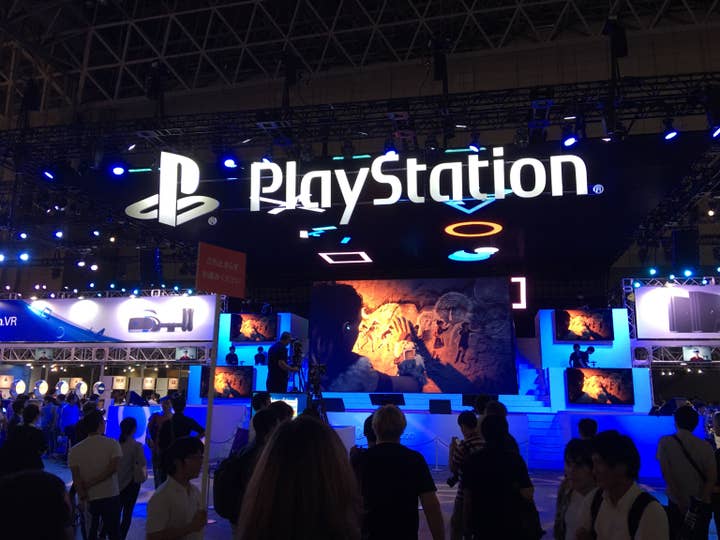TGS 2016: Mobile takes a back seat
The Tokyo Games Show remains a local, not international, showcase - but console games are back at the top of the menu
For the past few years, the Tokyo Games Show has been a barometer for the overall trends of the Japanese games market - with mobile games stealing more and more of console's thunder, both in the form of traditional publishers giving over more and more booth space to mobile titles, and mobile-only firms taking ever larger and more ambitious booths at the show. This came to a head last year, when the booth for a single mobile RPG, GranBlue Fantasy, was the same size as the entire PlayStation booth, with other mobile titles effectively dominating the show floor.
2015 was, it seems, a high water mark for mobile - at least for now. The mobile presence in 2016 is much more muted; there are no lavish, brash statements like the GranBlue Fantasy booth, many major mobile publishers are either absent or distinctly scaled down in their presence, and traditional publishers appear to have rediscovered their confidence in console titles. It's not that mobile is gone from the show by any means, but PS4 and (to a slightly lesser extent) 3DS titles are the core of TGS 2016, with mobile taking more of a supporting role.
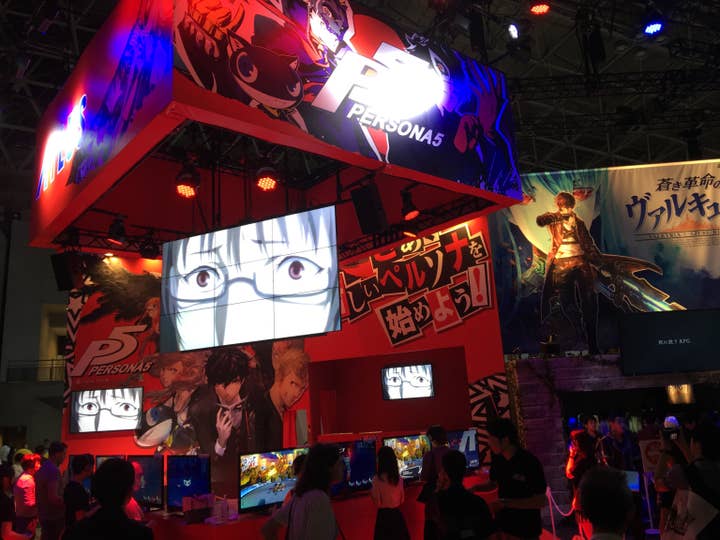
Aside from the lack of major mobile publisher booths, the shift in the show's balance is easily seen on the booths of the big traditional publishers. Perhaps the most impressive line-up is on Sega's booth, with the entire front of the booth dedicated to console big hitters - Persona 5, Valkyria: Azure Revolution and Yakuza 6. Around the side there's a small area for Titanfall 2, which Sega will publish in Japan, but the company's significant mobile interests only warrant small, understated areas at the back of the booth. A similar pattern is followed on other big publisher booths. Capcom is almost entirely about Resident Evil (nearly half of the booth is a reconstruction of the mansion from the Resident Evil 7 demo) and Monster Hunter Stories; Square Enix' focus is on Final Fantasy XV, with Kingdom Hearts 2.8 HD, Final Fantasy XIV's latest content updates and Square's extensive catalogue of third-party games it publishes in Japan also taking up a lot of space. The firm's pretty successful mobile titles barely make an appearance.
"This isn't just a problem for Sony, but for the industry at large and for event organisers everywhere; if VR demos become a major part of games shows, we're going to desperately need a better way of doing them"
Without a mobile firm with deep pockets trying to upstage it, Sony is unchallenged in terms of booth size this year. The company's booth is divided pretty evenly between PSVR and PS4, implying a genuine parity in the firm's priorities this year. On the PS4 side the booth is simply designed to fit in as many demo pods as possible so that as many consumers as possible can get hands-on time; Horizon, GT Sport, Gravity Daze 2 and Final Fantasy XV get premium billing, but the sheer range of games on display is a healthy sign for a console entering the middle of its life cycle. Demonstrating VR titles, though, still seems to be something Sony (and everyone else) is struggling with; it's done its best to fit in VR demo pods, but they intrinsically need more space than a normal console game (the PS Eye needs to be a minimum distance from the player, without people walking in between them and breaking the line of sight, it seems) and even on the business days, when the TGS halls aren't too full, the queues for VR demos were significant. This isn't just a problem for Sony, but for the industry at large and for event organisers everywhere; if VR demos become a major part of games shows, we're going to desperately need a better way of doing them.
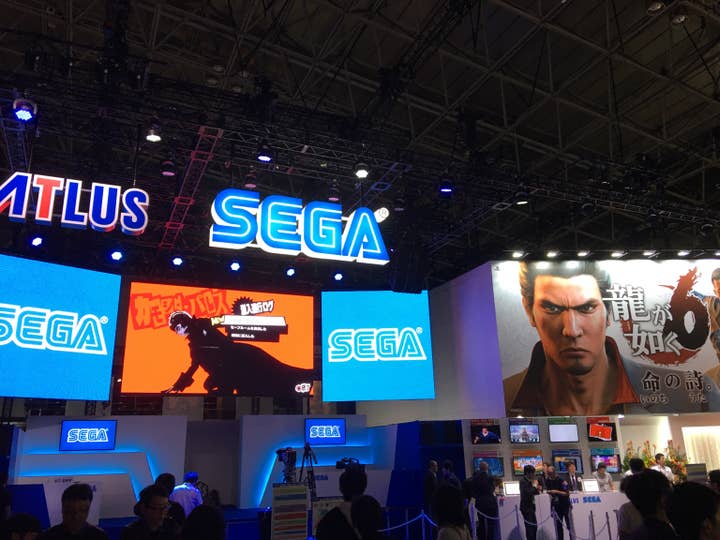
Although I'd imagine that TGS' renewed focus on consoles will be celebrated in many quarters, it would be wrong to read this as a sign of an underlying shift in the Japanese games market. The change in the tenor of TGS is not down to consumers suddenly flocking back to consoles; no market data supports that hypothesis, with mobile gaming still being absolutely in the ascendency in Japan. Rather, it's likely that the change is down to a belated recognition of what TGS' audience is and how the show can be most beneficial to its exhibitors. Big console titles benefit greatly from a chance to be seen and played by tens if not hundreds of thousands of the industry's most enthusiastic consumers. If the title has international appeal, the presence of the international press also provides a major bonus from a marketing standpoint (though the numbers of overseas press are notably more muted this year than last, perhaps due to the fundamental lack of much to write about last year outside of domestic Japanese mobile titles). Marketing for mobile games, though, is largely focused on TV and out-of-home campaigns, due to the need to acquire large numbers of players in order to overcome relatively low conversion rates. It's hard to imagine that GranBlue Fantasy's booth last year was a worthy investment in terms of player acquisition.
"The change in the tenor of TGS is not down to consumers suddenly flocking back to consoles; no market data supports that hypothesis, with mobile gaming still being absolutely in the ascendency in Japan"
That being said, the decisions of publishers to focus more on console titles than mobile isn't just down to a recognition that TGS isn't a particularly great investment for a mobile game. There's also the fact that while the PS4 isn't performing remotely as well in Japan as in other territories, it's still had a reasonably decent year of sales, and now has a fairly credible installed base - enough for publishers to feel a little more confident in the system. Incidentally, a notable exception is Konami; which aside from the inevitable Winning Eleven and Power Pro Baseball titles, the only game on Konami's booth that gets any decent space at all is a mobile card game based on Yu-Gi-Oh. The only evidence for the existence of the firm's planned post-Kojima revival of Metal Gear is a single poster tucked in behind an area where soccer players are performing ball tricks to promote Winning Eleven.
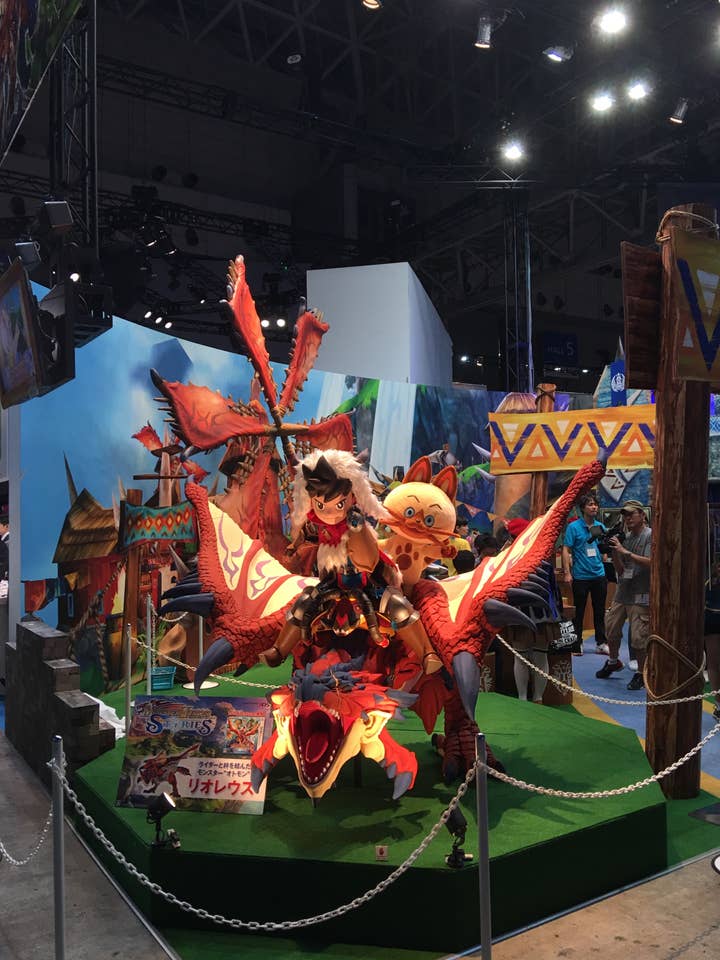
If the trend towards mobile dominance has turned around and retreated from 2015's peak, though, the trend towards serving the domestic market has continued apace. Once a tentpole of the global games industry, TGS has become a much more local event over the years, following a trend for establishing major game showcases in local territories around the world rather than focusing everything in E3 and a handful of other events. This year's TGS reflects that trend very clearly, perhaps alongside that new confidence in the Japanese domestic console market. The most notable expression is to be found on Bandai Namco's enormous booth; the company has constructed a veritable three-level amphitheatre next to the PlayStation booth, in which it is showcasing a line-up of games and franchises whose audience outside Japan is borderline negligible. Anime and manga tie-in titles like Gundam, Macross Delta, Naruto, Sword Art Online and One Piece are among the firm's biggest hitters this year; out of everything on display at the firm's booth, perhaps only the latest incarnations of Tekken and the Tales series are of significant interest abroad.
Other publishers, too, are keeping it local. Koei Tecmo's booth features the inevitable combination of this year's Sengoku Musou game (Sanada Maru, based on an event which was also the subject of a major historical drama series by Japanese national broadcaster NHK this year; if this is a deliberate tie-in by Koei Tecmo, it's a clever one) and this year's Winning Post horse-racing game, neither of which are going to ignite remotely as much interest abroad as they do in Japan. On the other hand, Nioh (which also takes up a decent chunk of Sony's PS4 booth) is pretty hotly anticipated everywhere, and likely to be Koei Tecmo's biggest game of the year by far.
"The indie area, although much bigger than in previous years when it tended to be tucked into empty space in one of the main halls, is a little problematic. It's full of great, interesting games, but the developers are shoved in like sardines"
One aspect of this local focus that's worth watching in future, though, is the extent to which TGS - as Asia's best known games event - seems to be turning into something of a hub for developers and publishers from other Asian territories. In the main halls of the show, there are major pavilions for South Korean, Taiwanese and Malaysian game developers, while developers from other ASEAN nations like the Philippines, Indonesia, Thailand and Vietnam share a large area. These booths feel a little out of place at the show, more designed for sitting down for business meetings and demonstrations than for entertaining the hordes of consumers who will pass through, but their very presence may point to a future for TGS not just as a local event for the Japanese market, but also as a meeting point between creators from other Asian markets and the world's games business and media.
On a similar note, an interesting evolution of the show this year (and a possible answer to the problem I raised regarding VR demos) is the revamping of Halls 9 to 11, which are located across a footbridge away from the main event halls. Though they've been part of TGS for years, these halls have often been ignored by attendees, especially on the business days - their most common function has been as a space for families to go and play games with small children. This year, the merchandise stalls from the main halls have been moved over to these halls (personal favourite merchandise item of the show: desks where you can fill out an application form for a Koei Tecmo or Capcom themed credit card), along with indie developers and VR companies. The result is a trinity of things people are genuinely interested in (indie games, VR, and buying exorbitant tat with money you probably need for food and rent) being located over the footbridge, which is consequently seeing far more traffic than I've ever seen at TGS before, and giving the show a sense of being genuinely more expansive than in previous years.
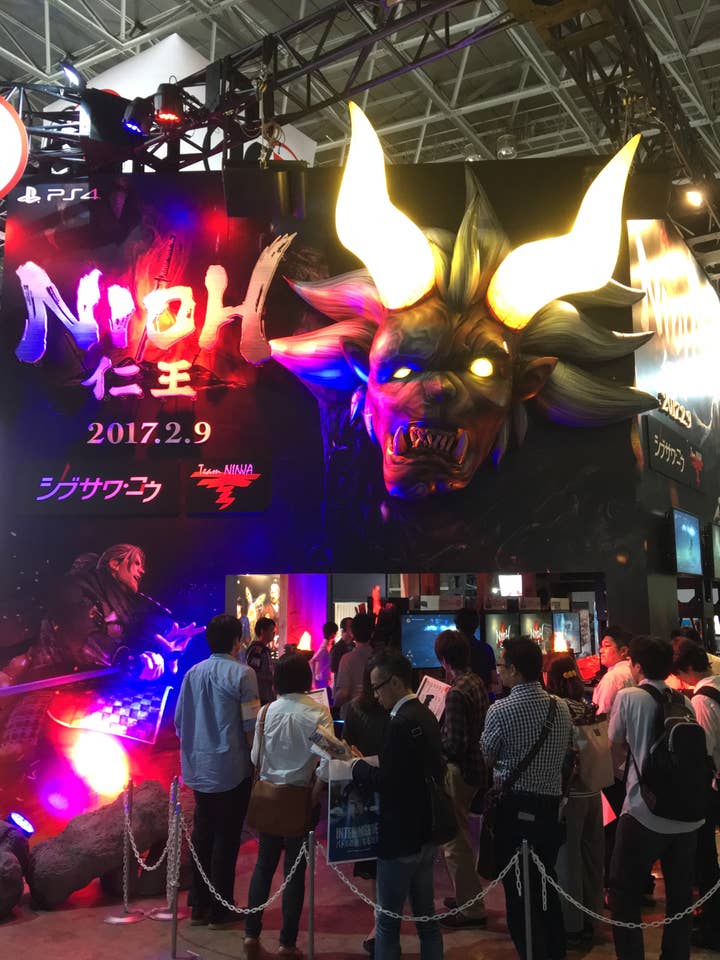
The indie area, although much bigger than in previous years when it tended to be tucked into empty space in one of the main halls, is a little problematic. It's full of great, interesting games, but the developers are shoved in like sardines - difficult enough for a normal game, but a major issue for the creators who have brought VR titles with them. While indie developers may not be a major source of profit to TGS, this still needs to be addressed; Kyoto's BitSummit, which I wrote about earlier in the summer, also has a space problem due to outgrowing its venue, but TGS has no such excuse, with significant areas of its expansive halls still being largely empty and the event's crowds (and thus potential problems with access to the small, closely packed booths) being orders of magnitude higher.
Overall, though, TGS' new layout is a positive move for the show - while, separate from the efforts of its organisers, the change in direction and focus of the exhibitors signals a welcome return to console roots. Without making a judgement on Japan's mobile games (many of which are excellent), there's no doubt that a show like this better serves, and is better served by, console titles. The local focus of many of those games means that for the western media who have downsized or eliminated their coverage of TGS in the wake of the mobile dominance of the show in recent years, restoring that coverage will remain a difficult choice; but it certainly feels like TGS 2016 is going to give the subset of consumers who make the pilgrimage out to Makuhari Messe far more of what they want from the show than in recent years.
